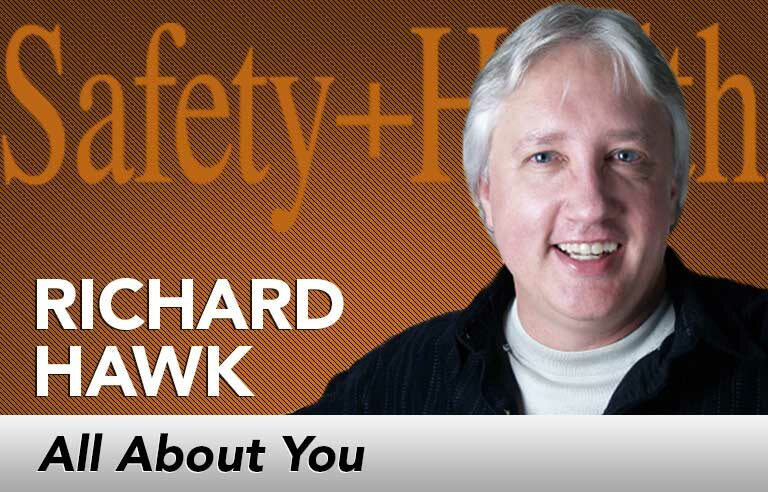All About You: Learning from mistakes

EDITOR’S NOTE: Motivating employees to work safely is part of the safety professional’s job. But who motivates the motivator? In this monthly column, veteran safety pro and professional speaker Richard Hawk offers his entertaining brand of wisdom to inspire safety pros to perform at their best.
Failures hurt. Mistakes sting, too. But both are an inevitable part of every active person’s life. When we fail, it can undermine our self-esteem and make us feel miserable – sometimes for quite a while.
The way we react to failure can vary widely depending on several factors, such as our upbringing, social status, work experience, genetics, general personality traits and other influences from our environment. Our physical health also may play a role in how we feel about mistakes and failures.
It’s easy to beat yourself up when things go wrong, especially if it was your actions (or lack of them) that caused the faux pas. It’s typical for people to dwell on what they did and feel regret about the outcome. What we need to keep in mind is that we learn and grow the most not from our successes, but from our failures and mistakes. I know it has been true for me. Although I don’t want to feel the pain that comes with a false step and I never purposely make mistakes, they have helped me to better my relationships and professional life.
Think about the safety field. Incidents and near misses often offer excellent learning opportunities for improving controls and behaviors. And although they are not wished for and certainly should be prevented as much as possible, disasters often stimulate dramatic positive shifts. (Even though it was a horrible tragedy, consider the needed changes in fire safety laws that were enacted after the 1911 Triangle Shirtwaist factory fire in New York City.)
Here are some tactics I use and that researchers, scientists, psychologists and other experts in the field recommend to ease the pain of failure and mistakes.
Let it go
After you’ve done whatever you can to lessen the impact of a blunder, stop dwelling on “I wish I hadn’t done it.” You can’t go back and change what happened. At the same time, don’t try to ignore your thoughts and bad feelings. I’ve mentioned this in previous articles, but it’s worth repeating here: Just notice your thoughts and feelings – don’t judge them or try to make them go away.
Keep in mind that perfection is not only impossible, it’s harmful to try to attain. As safety and health professionals who attempt to eliminate every hazard and misstep in the workplace, we can easily let that influence our thoughts and personal life and cause us to want “zero” mistakes. To dwell too long on something you didn’t do the right way or on a project that fell apart is a waste of energy.
Learn from it
According to Jeff Stibel, CEO of Dun & Bradstreet Credibility Corp., “Failure isn’t just the way to learn faster, it’s the only way to learn at all.” Stibel is referring to the way our brains learn and get rewired by adjusting to mistakes. (For more details, check out the excellent book, “The Upside of Down. Why Failing Well Is the Key to Success,” by Megan McArdle.) Stibel also believes that “failure is the only way a business grows.”
Whether large or small, errors can be used to do better next time. I failed miserably once on stage when I used Muppet-like puppets during a talk. (For more on what happened, listen to this month’s podcast.) Although I was upset for a bit, it was an awesome learning experience that gave me insight on how to connect better with my audiences. (I also learned that puppetry is a skill that requires practice!)
When you fail, take time to consider what caused it. Write down the answers to questions such as:
- What circumstances could I have changed?
- Why didn’t I realize it wouldn’t work?
- If I do it again, what should I do differently?
- How could I have prepared better?
- What other resources could I have used?
Although you won’t be able to completely prevent failures and mistakes in your life, you can learn from them.
 Richard Hawk helps companies around the world create more vibrant safety cultures by showing them how to make safety fun. As a professional speaker, author and musician, he also inspires employees to focus better and enlightens safety leaders about ways to increase their influence. To learn more about Richard, visit www.makesafetyfun.com.
Richard Hawk helps companies around the world create more vibrant safety cultures by showing them how to make safety fun. As a professional speaker, author and musician, he also inspires employees to focus better and enlightens safety leaders about ways to increase their influence. To learn more about Richard, visit www.makesafetyfun.com.
Subscribe to the podcast feed in iTunes
Post a comment to this article
Safety+Health welcomes comments that promote respectful dialogue. Please stay on topic. Comments that contain personal attacks, profanity or abusive language – or those aggressively promoting products or services – will be removed. We reserve the right to determine which comments violate our comment policy. (Anonymous comments are welcome; merely skip the “name” field in the comment box. An email address is required but will not be included with your comment.)

